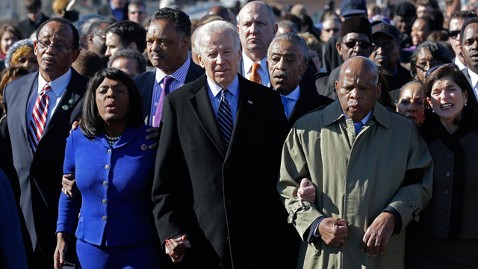Biden Defends Voting Rights Act Provision in Selma, Alabama

(Dave Martin/AP Photo)
Vice President Joseph Biden today urged the Supreme Court to uphold a provision of the Voting Rights Act that gives the federal government ongoing oversight of ballot collecting in states with histories of discrimination.
Speaking at annual memorial festivities in Selma, Ala., commemorating the 1965 civil rights march there, the vice president told a crowd including some of those original activists, "you know it continues on today."
"Look folks, here we are, 48 years after what you did, and we're still fighting," he said.
The Voting Rights Act of 1965 struck down Jim Crow segregation laws and other measures designed to impede or otherwise disenfranchise black voters. It has been renewed four times, most recently in 2006 when it passed Congress near-unanimously.
But last week conservative justices on the Supreme Court indicated they were ready to void a section of the law that requires certain states, mostly in the South, to seek federal approval for any changes to their voting regulations.
READ MORE: Supreme Court Seems Poised to Rule Against Part of Voting Rights act
"Section Five of the Voting Rights Act in 1965, OK? I even got credit getting [Sen.] Strom Thurmond to vote for its reauthorization in the Senate," Biden said, referring to the late, formerly segregationist lawmaker. "Strom Thurmond voted for its reauthorization in the Senate, and yet it's being challenged in the Supreme Court of the United States of America as we stand here today."
On Wednesday, Chief Justice John Roberts expressed concern that in its renewal Congress had used an outdated "coverage formula" that singled out certain states unfairly. Justice Antonin Scalia warned of "racial entitlements" that he said would prove "very difficult" to get rid of through democratic processes.
In his remarks today the vice president recalled a conversation that day with Rep. John Lewis, D-Ga., before an event celebrating Black History Month at Washington's Naval Observatory.
"Before he went up there I turned to John and said, 'John, did you ever think we'd be standing here in 2013, you introducing me in this house, just having come from the steps of the Supreme Court in 2013 to make the case against what the court may decide?'" the vice president said.
In addition to the Supreme Court, legislators in a number of states were actively looking for new ways to make it more difficult to vote, he said. Recalling his recent reelection campaign with President Obama, Biden said 41 states had passed laws attempting to curb same-day voter registration and early voting, and other measures liberals say were aimed at curbing the turnout of minority voters, a reliably Democratic voting bloc.
Lewis, the Rev. Jesse Jackson, and other veterans of the 1965 march were with the vice president in Selma to participate in a yearly reenactment trek across that town's Edmund Pettus Bridge. The original march stretched 50 miles to Montgomery, Ala., but not after demonstrators were first set upon by state and local police. The day became known as "Bloody Sunday" because of the brutality displayed against the marchers.
Selma police say 15,000 joined the leaders for this year's Bridge Crossing Jubilee.
Thanking the surviving civil rights leaders, the vice president said what happened nearly four decades ago was a lesson in courage.
"There's courage to stand up to the moral imperatives of the day to be the only odd man out in your community saying the right thing. But there's a different kind of courage standing there, looking at somebody who has a club in his hand, and you know - you know. You don't wonder, you don't guess, you know," he said. "That the courage to look evil in the eye, fight against it, never give up. Knowing that at the end of the day somehow believing, that though the cost may be high, that victory is inevitable. It takes a special breed of person to feel that."
Biden was a teenager living in Delaware at the time of the the march, and said that one of his few life regrets was that he did not participate in the event. The vice president credits civil rights leaders Sen. Herman Holloway and lawyer Louis L. Redding for having helped launch his political career as a young lawyer and Senate candidate.